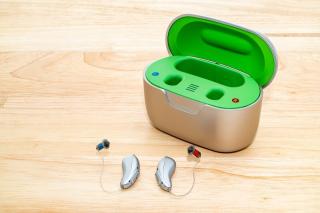Pros and Cons of Hearing Aids with Rechargeable Batteries

3 min read
Hearing aids are a crucial tool if you have hearing loss, enhancing your quality of life and connection to the world around you. When choosing hearing aid batteries, you must decide between rechargeable and disposable versions.
Rechargeable hearing aid batteries are popular because of their convenience and eco-friendliness, but are they the right choice for you? Explore the pros and cons of rechargeable batteries for hearing aids to determine if they fit your needs.
Rechargeable hearing aid batteries are popular because of their convenience and eco-friendliness, but are they the right choice for you? Explore the pros and cons of rechargeable batteries for hearing aids to determine if they fit your needs.
Pros of Rechargeable Hearing Aids
Here’s why rechargeable hearing aid batteries are an attractive option for many users:- Cost-effective over time: Though the initial cost of rechargeable batteries for hearing aids is typically higher, the long-term savings can be substantial. After all, rechargeable batteries can hold a charge for up to 30 hours and last about five years, resulting in cost savings over time.
- Convenient: Rechargeable hearing aids offer unparalleled ease of use. Simply place the hearing aids in their charging dock overnight, and they’re ready for the next day. There’s no need to constantly buy and replace small, fiddly disposable batteries, making good hearing easier to achieve.
- Environmentally responsible: Using rechargeable hearing aid batteries contributes to less environmental waste than disposable batteries. Just be sure to dispose of them properly when they reach the end of their lifespan to maximize this eco-friendly choice.
- Safer for kids: Disposable batteries pose a choking hazard to young children. On the other hand, rechargeable hearing aid batteries are contained within the device and aren’t easily accessible. This added layer of safety provides peace of mind for parents and caregivers.
Cons of Rechargeable Hearing Aids
While rechargeable hearing aids have many advantages, they still have drawbacks. Keep these factors in mind to help you make the right decision:- Initial cost: Rechargeable hearing aid batteries typically cost more upfront than traditional disposable batteries. This expense may be a barrier for some, even though it leads to long-term savings.
- Dependence on a charging unit: If you leave town and forget your charger or there’s no power source available, your hearing aids won’t be usable once their remaining charge runs out. This need to have a charger with you every night can create inconvenience, particularly during travel or when visiting areas with unreliable power.
- Limited compatibility: Not all hearing aids are compatible with rechargeable batteries, which may limit your options. Ensure your particular hearing aid model can accommodate rechargeable batteries before making the switch.
